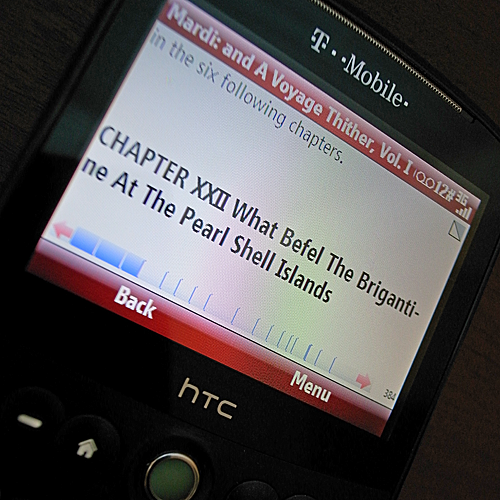As you may know, the first rule of my book club is, well, I can’t tell you the first rule. One of the other rules is, when it’s your turn, you pick the book and that’s the book. No discussion, voting or appeals are needed. Sure, there’s sometimes some friendly wrangling, but when push comes to shove, we read what is chosen for us. Last month, it was a lesser-known early work by Herman Melville, Mardi, and a Voyage Thither. The relative obscurity of this work provided some challenges and opportunities, as it’s pretty much out of print, but also out of copyright.
Having exhausted the obvious first choices of public libraries and used bookstores and come up empty, I decided to see what else was out there. Regular and online bookstores had or could order the book, but at 300+ pages each for two volumes, I thought this might finally be the time to look into electronic readers. The idea of carrying hundreds of books around in a few ounces of electronics never appealed much to me, but the idea of carrying around one very large book in a smaller form factor was starting to make me think again.
Kindle, Nook, iPod, iPad, PC – no shortage of reading devices, each covered plenty well by pundits worthier than I. But what about the media itself? It turns out that there’s something called Project Guternberg, a collection of free downloadable ebooks, generally ones that have landed in the public domain after their copyrights expired. There’s also Google Books of course, where you can read but not generally download books. Reading books on a 5 pound laptop wasn’t the answer I was looking for.
After some poking around, I found what I thought would be a terrible solution, but the price was right. I downloaded the free Mobipocket reader for my phone and picked up the Melville at Project Guternberg.

As it turned out, I read 350 pages of turgid 19th Century prose a few pages at a time on my two-train commute over the course of a month or so. It wasn’t ideal, but it was certainly convenient. I could read with one hand while holding on for dear life with the other. I didn’t have to worry about losing my place and even in a very crowded train, the device was small enough that I didn’t worry about elbowing fellow passengers while using it, and it was easy to slip back into a pocket without wrangling a book or larger device into and out of a bag or case.
I wondered if there was hope for paper. And then I met Paige.
In the back of the Harvard Bookstore is a Rube Goldberg contraption consisting of two different printers, a couple of computers and a clear plastic box containing some very sharp blades and pot of boiling hot glue. It’s called Paige M. Gutenberg. Get it? It’s a book machine. In goes paper, ink, glue and a digital file, and out comes a perfect-bound book in a couple of minutes. It’s a wacky marriage of cyber- and steampunk. You can smell the glue when you stand near it. I had to try it.

After some consultation with the staff, I learned that you first have to select (which generally means buy) the digital file from a variety of sources, and then once the machine is warmed up, the printing and binding takes just a few minutes. Unfortunately, for whatever reason, the files of Mardi were as costly, perhaps more so, than the pre-printed books. But in the spirit of investigation, I paid $30 for volume two and watched Paige crank it out. The print quality was great and the paper stock pleasant. The cover (also printed on the spot with a different printer on different stock) was a little on the cheap side, and the binding was not quite perfect perfect binding.
All in all, if you really need it right away or it’s out of print, this is a great thing. But I fear it’s years late and more than a few dollars short in holding back ebooks. Sure, it makes high(ish) quality printing and binding on demand available to small-time authors or artists, but even a five minute wait at a bookstore compares poorly with near-instant delivery to a computer or handheld device. And if you insist on paper, you can often get cheaper and higher quality books shipped in a few days – even same day in some cities – from the giants of ecommerce.
Still, I’m glad there are options, especially because those options are evidence of interest in the business of publishing which means people are still reading, and that’s good.
